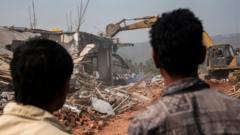In a landmark decision, India's Supreme Court has declared the practice of "bulldozer justice" - the demolition of homes belonging to individuals accused or convicted of crimes - illegal. This ruling comes as Afreen Fatima, an activist from Prayagraj, recounts the painful destruction of her childhood home in the summer of 2022. The home was demolished by authorities overnight following the arrest of her father, local politician Javed Mohammad, who was accused but not convicted of involvement in a violent protest.
While the court's ruling is a significant step in curbing arbitrary demolitions, it has left many former victims, like Ms. Fatima's family, without recourse for the losses they have already suffered. During the 20 months that her father spent in jail, the family moved twice, trying to find a semblance of stability in a time of uncertainty. Now, even though they are settled, Ms. Fatima notes that the new house feels like an "adopted space" and lacks the warmth of childhood memories.
Despite the comprehensive judgment that mandates authorities give 15 days' notice before demolishing properties, the court did not address compensation for displaced families. This omission resonates deeply with victims of the bulldozer policy, as they seek accountability for lost homes. According to experts, up to 128 structures were razed as a punitive measure within a three-month period in 2022 alone.
Legal perspectives on the court’s ruling highlight that it sets a precedent for future cases, demanding adherence to lawful procedures during demolitions. However, the emotional toll on families who have lost their homes due to political actions remains largely unacknowledged. Ms. Fatima and other victims, like Reshma, who lost her home under similar circumstances, call for tangible support rather than legal declarations that offer little consolation.
As families grapple with the aftermath of demolitions and await legal proceedings with uncertain outcomes, hope for renewal exists. Afreen Fatima's father persists in efforts to rebuild his life, focusing on the future despite the heavy burden of past loss. His resolve embodies a broader sentiment as many affected families strive to renovate their lives, even when memories of their past lay buried in rubble.



















